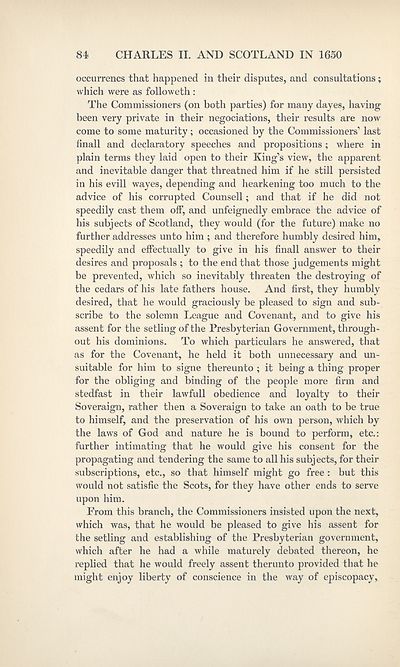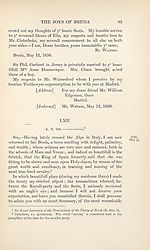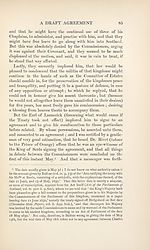Series 1 > Letters and papers illustrating the relations between Charles the Second and Scotland in 1650
(115) Page 84
Download files
Complete book:
Individual page:
Thumbnail gallery: Grid view | List view

84
CHARLES II. AND SCOTLAND IN 1650
occurrencs that happened in their disputes, and consultations;
which were as followeth :
The Commissioners (on both parties) for many dayes, having
been very private in their negociations, their results are now
come to some maturity; occasioned by the Commissioners’ last
finall and declaratory speeches and propositions; where in
plain terms they laid open to their King’s view, the apparent
and inevitable danger that threatned him if he still persisted
in his evill wayes, depending and hearkening too much to the
advice of his corrupted Counsell; and that if he did not
speedily cast them off, and unfeignedly embrace the advice of
his subjects of Scotland, they would (for the future) make no
further addresses unto him ; and therefore humbly desired him,
speedily and effectually to give in his finall answer to their
desires and proposals ; to the end that those judgements might
be prevented, which so inevitably threaten the destroying of
the cedars of his late fathers house. And first, they humbly
desired, that he would graciously be pleased to sign and sub¬
scribe to the solemn League and Covenant, and to give his
assent for the setling of the Presbyterian Government, through¬
out his dominions. To which particulars he answered, that
as for the Covenant, he held it both unnecessary and un¬
suitable for him to signe thereunto ; it being a thing proper
for the obliging and binding of the people more firm and
stedfast in their lawfull obedience and loyalty to their
Soveraign, rather then a Soveraign to take an oath to be true
to himself, and the preservation of his own person, which by
the laws of God and nature he is bound to perform, etc.:
further intimating that he would give his consent for the
propagating and tendering the same to all his subjects, for their
subscriptions, etc., so that himself might go free : but this
would not satisfie the Scots, for they have other ends to serve
upon him.
From this branch, the Commissioners insisted upon the next,
which was, that he would be pleased to give his assent for
the setling and establishing of the Presbyterian government,
which after he had a while maturely debated thereon, he
replied that he would freely assent therunto provided that he
might enjoy liberty of conscience in the way of episcopacy.
CHARLES II. AND SCOTLAND IN 1650
occurrencs that happened in their disputes, and consultations;
which were as followeth :
The Commissioners (on both parties) for many dayes, having
been very private in their negociations, their results are now
come to some maturity; occasioned by the Commissioners’ last
finall and declaratory speeches and propositions; where in
plain terms they laid open to their King’s view, the apparent
and inevitable danger that threatned him if he still persisted
in his evill wayes, depending and hearkening too much to the
advice of his corrupted Counsell; and that if he did not
speedily cast them off, and unfeignedly embrace the advice of
his subjects of Scotland, they would (for the future) make no
further addresses unto him ; and therefore humbly desired him,
speedily and effectually to give in his finall answer to their
desires and proposals ; to the end that those judgements might
be prevented, which so inevitably threaten the destroying of
the cedars of his late fathers house. And first, they humbly
desired, that he would graciously be pleased to sign and sub¬
scribe to the solemn League and Covenant, and to give his
assent for the setling of the Presbyterian Government, through¬
out his dominions. To which particulars he answered, that
as for the Covenant, he held it both unnecessary and un¬
suitable for him to signe thereunto ; it being a thing proper
for the obliging and binding of the people more firm and
stedfast in their lawfull obedience and loyalty to their
Soveraign, rather then a Soveraign to take an oath to be true
to himself, and the preservation of his own person, which by
the laws of God and nature he is bound to perform, etc.:
further intimating that he would give his consent for the
propagating and tendering the same to all his subjects, for their
subscriptions, etc., so that himself might go free : but this
would not satisfie the Scots, for they have other ends to serve
upon him.
From this branch, the Commissioners insisted upon the next,
which was, that he would be pleased to give his assent for
the setling and establishing of the Presbyterian government,
which after he had a while maturely debated thereon, he
replied that he would freely assent therunto provided that he
might enjoy liberty of conscience in the way of episcopacy.
Set display mode to:
![]() Universal Viewer |
Universal Viewer | ![]() Mirador |
Large image | Transcription
Mirador |
Large image | Transcription
Images and transcriptions on this page, including medium image downloads, may be used under the Creative Commons Attribution 4.0 International Licence unless otherwise stated. ![]()
| Scottish History Society volumes > Series 1 > Letters and papers illustrating the relations between Charles the Second and Scotland in 1650 > (115) Page 84 |
|---|
| Permanent URL | https://digital.nls.uk/127071873 |
|---|
| Attribution and copyright: |
|
|---|
| Description | Over 180 volumes, published by the Scottish History Society, containing original sources on Scotland's history and people. With a wide range of subjects, the books collectively cover all periods from the 12th to 20th centuries, and reflect changing trends in Scottish history. Sources are accompanied by scholarly interpretation, references and bibliographies. Volumes are usually published annually, and more digitised volumes will be added as they become available. |
|---|


